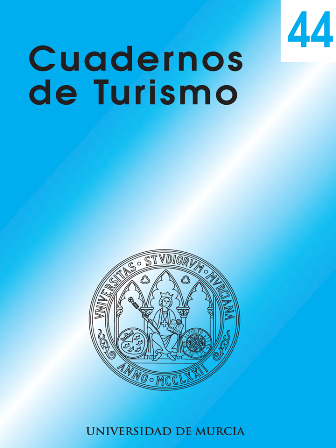Multinacionales de mercados emergentes y adquisiciones internacionales: el caso de las empresas chinas en el sector hotelero español
Resumen
La expansión internacional de las multinacionales de mercados emergentes está adquiriendo una creciente importancia en los últimos años. El sector hotelero no es ajeno a esta tendencia. El objetivo de este trabajo es analizar si los modelos teóricos tradicionales resultan aplicables al caso de las inversiones efectuadas por empresas turísticas chinas o si, por el contrario, se hace necesario utilizar nuevos planteamientos. A partir de un estudio de casos de tres empresas chinas que han invertido en el sector hotelero español, nuestros resultados indican que dichas empresas, más que explotar sus ventajas competitivas, persiguen obtener nuevas fuentes de ventaja. Asimismo, en lugar de seguir un proceso gradual, optan por modos de establecimiento que les permitan acceder de forma rápida a esos activos estratégicos.
Descargas
-
Resumen745
-
PDF881
-
PDF 881
Citas
ANAND, N., GARDNER, H.K. y MORRIS, T. (2007): “Knowledge-based innovation: Emergence and embedding of new practice areas in management consulting firms”, Academy of Management Journal, vol. 50, nº 2, pp. 406-428.
ANDREU, R., CLAVER, E. y QUER, D. (2009): “China: ¿oportunidad o amenaza para el turismo español?”, Boletín Económico de Información Comercial Española, nº 2958, pp. 25-35.
BUCKLEY, P,J., CLEGG, L.J., CROSS, A.R., LIU, X., VOSS, H. y ZHENG, P. (2007): “The determinants of Chinese foreign direct investment”, Journal of International Business Studies, vol. 38, nº 4, pp. 499-518.
BUCKLEY, P,J., YU, P., LIU, Q., MUNJAL, S. y TAO, P. (2016): “The institutional influence on the location strategies of multinational enterprises from emerging economies: Evidence from China’s cross-border mergers and acquisitions”, Management and Organization Review, vol. 12, nº 3, pp 425-448.
CARRIL, F. y MILGRAM, J. (2016): “From Beijing to Madrid: Profiles of Chinese investors in Spain”, Universia Business Review, nº 51, pp. 112-129.
CASABURI, I. (2016): Tendencias de la Inversión China en Europa. Informe 2016-2017. ESADE China Europe Club. Barcelona.
CHILD, J. y MARINOVA, S. (2014): “The role of contextual combinations in the globalization of Chinese firms”, Management and Organization Review, vol. 10, nº 3, pp. 347-371.
CHILD, J. y RODRIGUES, S. B. (2005): “The internationalization of Chinese firms: A case for theoretical extension?”, Management and Organization Review, vol. 1, nº 3, pp. 381-410.
CUERVO-CAZURRA, A. (2012): “Extending theory by analyzing developing country multinational companies: Solving the Goldilocks debate”, Global Strategy Journal, vol. 2, nº 3, pp. 153-167.
DIKOVA, D. y VAN WITTELOOSTUIJN, A. (2007): “Foreign direct investment mode choice: Entry and establishment modes in transition economies”, Journal of International Business Studies, vol. 38, nº 6, pp. 1013-1033.
DUANMU, J.L. (2014): “State-owned MNCs and host country expropriation risk: The role of home state soft power and economic gunboat diplomacy”, Journal of International Business Studies, vol. 45, nº 8, pp. 1044-1060.
DUNNING, J.H. (1980). “Toward and eclectic theory of international production: Some empirical tests”, Journal of International Business Studies, vol. 11, nº 1, pp. 9-31.
DUNNING, J.H. (1988): “The eclectic paradigm of international production: A restatement and some possible extensions”, Journal of International Business Studies, vol. 19, nº 1, pp. 1-32.
DUNNING, J.H. (1995): “Reappraising the eclectic paradigm in the age of alliance capitalism”, Journal of International Business Studies, vol. 26, nº 3, pp. 461-493.
DUNNING, J.H. (2000): “The eclectic paradigm as an envelope for economic and business theories of MNE activity”, International Business Review, vol. 9, nº 1, pp. 163-190.
DUNNING, J.H. (2006): “Comment on Dragon multinationals: New players in 21st century globalization”, Asia Pacific Journal of Management, vol. 23, nº 2, pp. 139-141.
DUNNING, J.H. y McQUEEN, M. (1982a): “Multinational corporations in the international hotel industry», Annals of Tourism Research, vol. 9, nº 1, pp. 69-90.
DUNNING, J.H. y McQUEEN, M. (1982b): “The eclectic theory of the multinational enterprise and the international hotel industry”, en RUGMAN, A.M. (Ed.): New Theories of the Multinational Enterprise. Croom Helm. London, pp. 79-106.
EISENHARDT, K.M. (1989): “Building theories from case-study research”, Academy of Management Review, vol. 14, nº 4, pp. 532-550.
EISENHARDT, K.M. y GRAEBNER, M.E. (2007): “Theory building from cases: Opportunities and challenges”, Academy of Management Journal, vol. 50, nº 1, pp. 25-32.
GE, G.L. y DING, D.Z. (2008): “A strategic analysis of surging Chinese manufacturers: The case of Galanz”, Asia Pacific Journal of Management, vol. 25, nº 4, pp. 667-683.
GE, G.L. y DING, D.Z. (2009): “The effects of the institutional environment on the internationalization of Chinese firms”. En ALON, I. et al. (Eds.), China Rules. Globalization and Political Transformation. Palgrave MacMillan. Hampshire, pp. 46-68.
GLOBERMAN, S. y SHAPIRO, D. (2009): “Economic and strategic considerations surrounding Chinese FDI in the United States”, Asia Pacific Journal of Management, vol. 26, nº 1, pp. 163-183.
HENNART, J.F. (2012): “Emerging market multinationals and the theory of the multinational enterprise”, Global Strategy Journal, vol. 2, nº 3, pp. 168-187.
HERNÁNDEZ, A. y ÁLVAREZ, O. (2009): “China, nuevo actor de la inversión extranjera global”, Boletín Económico de Información Comercial Española, nº 2972, pp. 165-175.
HERNÁNDEZ, E. (2018): “El turismo chino en España: oportunidad y nuevas tendencias”, Real Instituto Elcano, ARI 48/2018, pp. 1-8.
INE (2018): Estadística de Movimientos Turísticos en Frontera-Frontur. Instituto Nacional de Estadística. Madrid [www.ine.es].
JOHANSON, J. y VAHLNE, J.E. (1977): “The internationalization process of the firm. A model of knowledge development and increasing foreign market commitments”, Journal of International Business Studies, vol. 8, nº 1, pp. 23-32.
JOHANSON, J. y VAHLNE, J.E. (1990): “The mechanism of internationalization”, International Marketing Review, vol. 7, nº 4, pp. 11-24.
JOHANSON, J. y VAHLNE, J.E. (2009): “The Uppsala internationalization process model revisited: From liability of foreignness to liability of outsidership”, Journal of International Business Studies, vol. 40, nº 9, pp. 1411-1431.
JOHANSON, J. y WIEDERSHEIM-PAUL, F. (1975): “The internationalization of the firm. Four Swedish cases”, Journal of Management Studies, vol. 12, nº 3, pp. 305-322.
KEDIA, B., GAFFNEY, N. y CLAMPIT, J. (2012): “EMNEs and knowledge-seeking FDI”, Management International Review, vol. 52, nº 2, pp. 155-173.
KIM, J.U., y AGUILERA, R.V. (2016): “Foreign location choice: Review and extensions”, International Journal of Management Reviews, vol. 18, nº 2, pp. 133-159.
KOLSTAD, I. y WIIG, A. (2012): “What determines Chinese outward FDI?”, Journal of World Business, vol. 47, nº 1, pp. 26-34.
LI, P.P. (2007): “Toward an integrated theory of multinational evolution: The evidence of Chinese multinational enterprises as latecomers”. Journal of International Management, vol. 13, nº 3, pp. 296-318.
LIU, X., XIAO, W. y HUANG, X. (2008): “Bounded entrepreneurship and internationalisation of indigenous Chinese private-owned firms”, International Business Review, vol. 17, nº 4, pp. 488-508.
LOJO, A. (2016): “Chinese tourism in Spain: An analysis of the tourism product, attractions and itineraries offered by Chinese travel agencies”, Cuadernos de Turismo, nº 37, pp. 243-268.
LOJO, A. y LI, M.M. (2018): “Segmentation by experiential familiarity and travel mode of the Chinese outbound market to Spain”, Journal of China Tourism Research, vol. 14, nº 1, pp. 100-121.
LUO, Y. y TUNG, R.L. (2007): “International expansion of emerging-market enterprises: A springboard perspective”, Journal of International Business Studies, vol. 38, nº 4, pp 481-498.
LUO, Y. y TUNG, R.L. (2018): “A general theory of springboard MNEs”, Journal of International Business Studies, vol. 49, nº 2, pp. 129-152.
MATHEWS, J.A. (2002): “Competitive advantages of the latecomer firm: A resource-based account of industrial catch-up strategies”, Asia Pacific Journal of Management, vol. 19, nº 4,
MATHEWS, J.A. (2006): “Dragon multinationals: New players in 21st century globalization”, Asia Pacific Journal of Management, vol. 23, nº 1, pp. 5-27.
NARULA, R. (2012): “Do we need different frameworks to explain infant MNES from developing countries?”, Global Strategy Journal, vol. 2, nº 3, pp. 188-204.
QUER, D., CLAVER, E. y RIENDA, L. (2015): “Chinese outward foreign direct investment: A review of empirical research”, Frontiers of Business Research in China, vol. 9, nº 3, pp. 326-370.
QUER, D., CLAVER, E. y RIENDA, L. (2017): “Chinese multinationals in Spain: Determinants of establishment mode choice”, Cuadernos de Gestión, vol. 17, nº 2, pp. 15-36.
RAMASAMY, B., YEUNG, M. y LAFORET, S. (2012): “China’s outward foreign direct investment: Location choice and firm ownership”, Journal of World Business, vol. 47, nº 1, pp. 17-25.
RUGMAN, A.M. (2010): “Book review: Globalization of Chinese enterprises”, The International Trade Journal, vol. 24, nº 3, pp. 352-354.
SÁEZ, L., (2010): “Chinese outward direct investments in Spain”. International Economics Programme Paper 2010/06. Chatam House. London.
SANTACANA, R. y WANG, Y.J., (2008): “Privatización e internacionalización: las empresas chinas en España”, IX Congreso Internacional de la Asociación Española de Historia Económica. Murcia. Septiembre.
STATE COUNCIL (2017): Guidelines on Further Guiding and Regulating the Directions of Outbound Investments. State Council of the People's Republic of China. Beijing [www.gov.cn].
STRANGE, R. (2018): “Corporate ownership and the theory of the multinational enterprise”. International Business Review. vol. 27, nº 6, pp. 1229-1237.
UNCTAD (2018): World Investment Report 2018. Investment and New Industrial Policies. United Nations Conference on Trade and Development. New York and Geneva.
WALSH, J.P., WANG, E. y XIN, K.R. (1999): “Same bed, different dreams: Working relationships in Sino-American joint ventures”, Journal of World Business, vol. 34, nº 1, pp. 69-93.
YIN, R.K. (1981): “The case study crisis: Some answers”, Administrative Science Quarterly, vol. 26, nº 1, pp. 58-65.
YIN, R.K. (2014): Case Study Research: Design and Methods. 5th edition. Sage. Thousand Oaks, CA.
Las obras que se publican en esta revista están sujetas a los siguientes términos:
1. El Servicio de Publicaciones de la Universidad de Murcia (la editorial) conserva los derechos patrimoniales (copyright) de las obras publicadas, y favorece y permite la reutilización de las mismas bajo la licencia de uso indicada en el punto 2.
2. Las obras se publican en la edición electrónica de la revista bajo una licencia Creative Commons Reconocimiento-NoComercial-SinObraDerivada 3.0 España (texto legal). Se pueden copiar, usar, difundir, transmitir y exponer públicamente, siempre que: i) se cite la autoría y la fuente original de su publicación (revista, editorial y URL de la obra); ii) no se usen para fines comerciales; iii) se mencione la existencia y especificaciones de esta licencia de uso.
3. Condiciones de auto-archivo. Se permite y se anima a los autores a difundir electrónicamente las versiones pre-print (versión antes de ser evaluada) y/o post-print (versión evaluada y aceptada para su publicación) de sus obras antes de su publicación, ya que favorece su circulación y difusión más temprana y con ello un posible aumento en su citación y alcance entre la comunidad académica. Color RoMEO: verde.





_.jpg)









